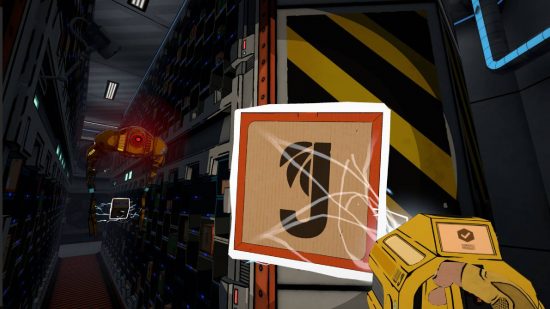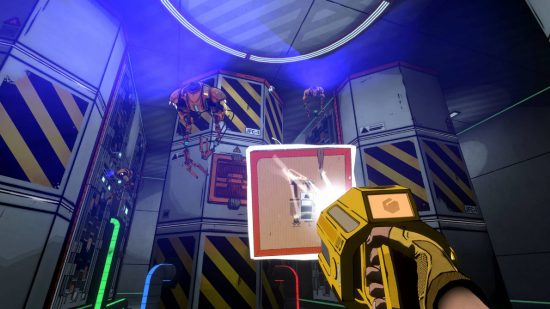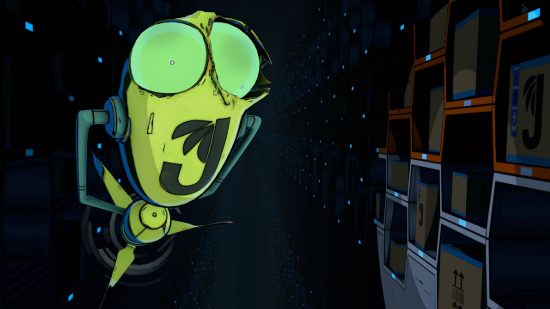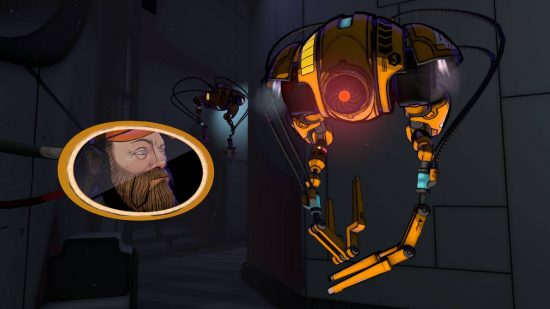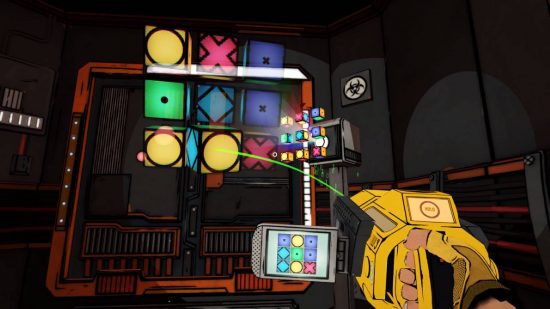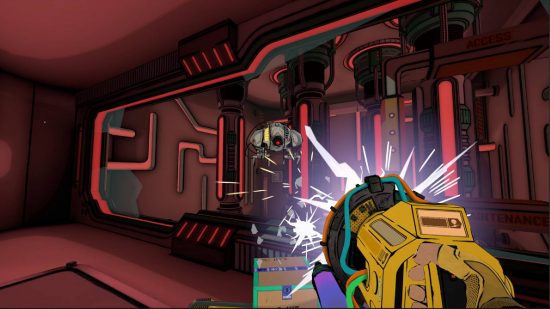With the world slowly becoming more automated, and the monolith monopoly known as Amazon encroaching on every aspect of business, it can seem quite hopeless to battle against the rising tide of capitalism. A necessary evil, but one that also seems to be swallowing up small businesses, so it’s no surprise that the tech giant is ripe for a parody.
In comes developer Wolf & Wood, and its new game The Last Worker. A slick skewering of capitalism and the ever-encroaching reach of big business. While you can buy items and have them delivered that day, and companies invest in drones to deliver quicker, purchases are becoming an increasingly complex Rube Goldberg machine of misery, with regular people paying the price of convenience.
Kurt is The Last Worker at Jüngle, a thinly veiled swipe at Amazon, he must deliver packages that people don’t need and he must do it quickly or robots will replace the very last human within this corporate machine. With a sardonic wit, Kurt delivers those packages alongside his plucky Jüngle-drone known as Skew, played by Jason Isaacs with an almost Guy Ritchie-style British accent.
While Kurt plugs away at his job, the outside world is falling apart, and Jüngle is at the heart of it. So, hopeful outside forces start to meddle in affairs, and Kurt must work alongside these rebels to take down Jüngle from the inside. Of course, a much more sinister plot is at play, and the more Kurt discovers about Jüngle, the worse the company appears.
It’s a great set-up for a game with a nice mixture of interesting gameplay, alongside fantastic vocal performances and humour. This is a title that has a specific story to tell, and it does it very well. In particular, Ólafur Darri Ólafsson’s performance as Kurt is a standout, perfectly conveying a hopeful and kind man, but one broken by the powerful company that holds him ransom.
The main gameplay hook here is delivering packages, as Kurt flies around in a Jüngle-pod (yes, a bit like the humans in Wall-E), finding and checking packages, either to deliver them to the right place, or mark them damaged or incorrect, only to then recycle them. There’s not a huge amount of variation here, but it’s fun checking the weight and size of packages to match the order, or slapping a damaged sticker on items when they need to be recycled.
You’re marked on your performance based on your ability to spot damaged or mislabelled packages, as well as the speed at which you deliver both damaged and adequate orders. Helpfully, a small radar on your craft points you in the right direction, and you can briefly boost your pod to get to packages quicker. As satisfying as this is, it can get old, but thankfully it’s merely dressing for the larger story at play.
As the story advances, different gameplay elements come into play, as Kurt pokes around the darker corners of the Jüngle complex, hiding from security robots and attempting to commit subterfuge all while still maintaining his daily tasks. Much of your time is spent ducking away from the laser sight of those security robots and working to slip into restricted areas alongside your robot Skew and a hummingbird robot sent by the rebels on the outside.
There’s a lot of time spent hiding from security robots and while later chapters give you some small ways to counter them, I occasionally find myself itching to continue the story but having to patiently tuck myself away to slip away from the gaze of those aggressive automatons. Luckily, The Last Worker does have plenty of other gameplay elements, but the extended focus on playing hide and seek with those drones is tiresome at points.
It’s hard to talk about different gameplay elements without spoiling the story, which is something you should experience as you play, but suffice to say that there are at least several interesting expansions of the basic mechanics, as Kurt attempts to take down Jüngle from within. The first-person view works well for all of them, as you control the mechanical arm that grabs packages, or hacks technology, in a style almost certainly inspired by classics such as Portal.
The controls work well on Switch, and thankfully for any first-person game, there are also options for motion controls, making grabbing certain packages or manoeuvering gameplay that much easier. Playing in handheld feels especially good, as you manipulate the Switch itself to adjust your view, which works very well alongside the perspective of the gameplay.
While the topics explored in The Last Worker are heavy, and get much bleaker as they progress, the accompaniment of Kurt’s drone friend Skew and the hummingbird drone belonging to the rebels keep the tone light, with both constantly piping up with quips, and a fun adversarial tone between them. Jason Isaac’s Skew is a delight and the author of most of the game’s biggest laughs, but occasionally the amount of dialogue does dip into annoying.
It’s not a huge issue, as all the larger story moments are afforded the space and severity needed, and there are some heavy moments to be found. Kurt’s story especially is a deeply sad one, bound by his commitment to Jüngle, but he is clearly a man desperate for connection, and a purpose outside of the Jüngle walls. Between the mixture of gameplay mechanics and the fantastic performances, I find The Last Worker is one of the most consistently engaging narrative titles I’ve played in years, and is almost worth playing for the story alone.
The visual style is a great match for the tone, with a cel-shaded and almost cartoonish approach, that adds a distinct charm to each chapter. Alongside the ridiculous packages you send like Stingray Guitars and Baby VR Goggles, the colourful and striking style matches the political parody perfectly. Kurt is even heard exclaiming “I’d buy that for a dollar” on occasion when successfully sending items, a knowing nod to Paul Verhoeven’s Robocop, and the style of satire that The Last Worker is so successfully aping.
It’s a short title, coming in at about four or five hours, but I think that makes it perfect for completing in a couple of sittings. Perhaps because of the purposefully monotonous nature of the package-delivering mechanics, or my time hiding from robots, I struggled to push through at times, but with four distinct chapters, I recommend giving yourself some space between them. This is a story well worth experiencing and I love most of the gameplay but don’t be surprised if you get a little fatigued.

The Last Worker is an admirable pastiche of modern capitalist culture and one that delivers a story both with knowing humour and surprising emotional beats. Anyone else feeling slightly helpless among the oppressive omnipotence of big business will find catharsis in this tale of one man’s fight against a tech giant, and the gameplay keeps things fresh throughout the short campaign. A little more variety might demand a tighter grasp on my attention, but I still enjoy everything the game has to offer.
For even more great games, be sure to check out our guides to the best horror games and the best ghost games.
The Last Worker Switch review
A knowing satire of big business, The Last Worker is a cathartic fight against the forces of capitalism, and one that centres it all with a very human story and fantastic performances. While delivering packages is satisfying, occasionally the gameplay outside of this drags the narrative down, but this still ticks almost all of the right boxes.
